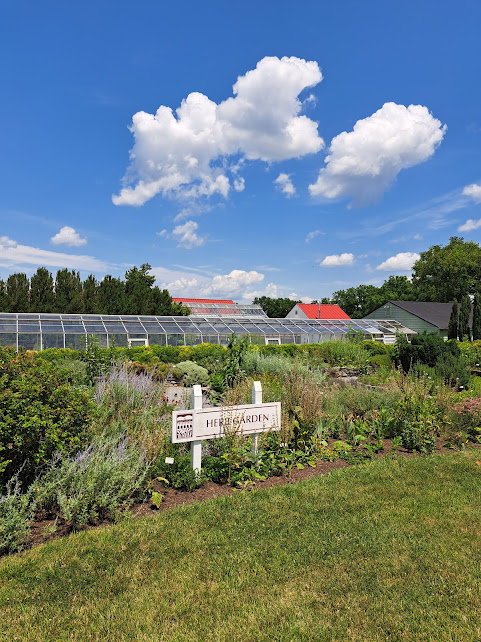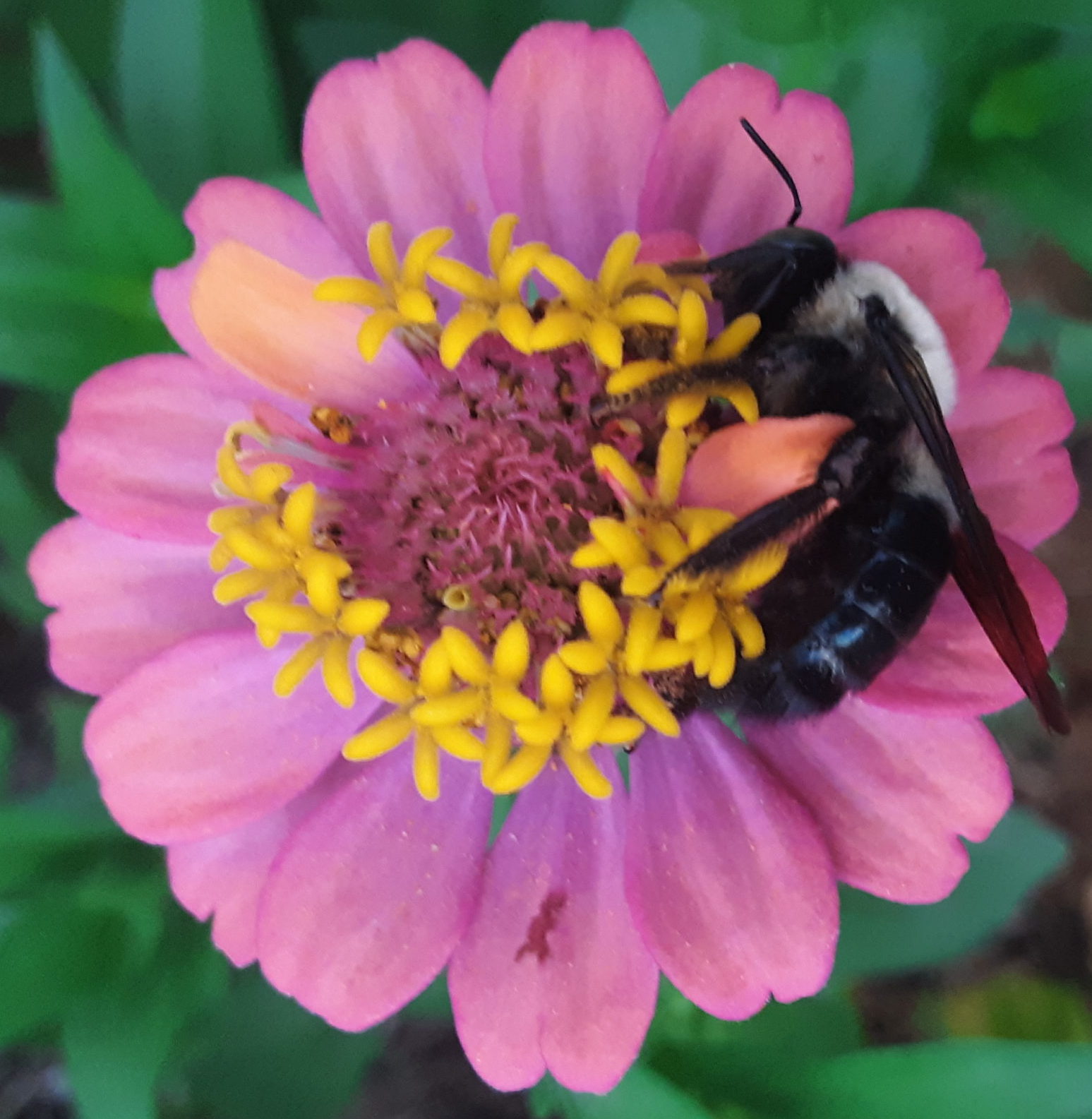Some of the best online, app and in-person garden resources for Virginia gardeners

Free and Low-cost garden education resources in Virginia
In this post, we will discuss apps, local classes local certifications, schools, conferences, public gardens and nature center programs, WWOOF (Willing Workers on Organic Farms), and intern and work suggestions.
Garden apps
In my garden class, we go around to different beds and wild areas to identify and learn more about plants, and compare garden app results. We have mostly used iNaturalist, Seek, Picture This, and Google Lens. A newer one I have heard of (mostly for native plants) is the Virginia Flora app, and I also like Merlin (a bird identifying app developed at Cornell).
Two years ago, Picture This was the most accurate, and it was one that cost money, whereas Seek and Google Lens are free, or have free versions. Because of the rapid development of AI, Google Lens has become much more accurate in just the two years I have performing this little experiment. I will keep paying for Picture This, though, because it also has plant care tips, relevant seasonal posts, disease diagnoses and tells you when that plant has appeared in literature and poetry (and as an English major, I like that!)
Master Gardener, Master Naturalist and Tree Steward Programs
I took the Virginia Beach Master gardener program many moons ago, and it is still run the same general way in cities and counties around Virginia. It is run through the Virginia Agriculture Extension Program, and lasts about two months. For about $200-300, one receives an ENORMOUS binder and approximately 50 hours of training in gardening topics such as soils, flowers, herbs, disease prevention, etc. Usually, these lectures and field trips are led by several different speakers, and you learn sooo much in a short time!
After you complete the training (you may miss ONE class, that is all), you are expected to then complete about 50 hours of volunteer training. After you complete those hours, you become a certified Master Gardener, and you maintain that certification with 50 hours of volunteer work a year.
It sounds daunting, but that is equivalent to less than 1 hour a week, 10 five-hour days (and there usually MANY events for which to volunteer), or about 4 hours a month. They are happy to have people take calls on the plant line, speak at events, write for the newsletters, and donate plants or garden in the myriad beds they maintain. You will make friends with more plant people, see beautiful gardens, and come away with at least one plant. (I promise!) It is a great deal, and a wonderful way to be involved in your community.
The other programs, Master Naturalists and Tree Stewards have similar costs and time commitments, and also are overseen by the Extension service. I would like to complete both of those as well, one day!
Garden groups, Clubs, Societies
There is something for almost everyone in Virginia: Camellia societies, Native plant societies, Herbal groups, cannabis clubs, Butterfly societies, neighborhood garden groups, schoolyard gardens, community gardens. Most of these types of groups have their focus and meet 1-4 times a month. Their membership and time commitment is usually low-cost and minimal, and flexible for almost any schedule.
Conferences and festivals
There are organic farming conferences (January, Virginia Biological farming Association), Cut Flower programs year-round online and in-person (Virginia State University), Herbs (May, in Richmond), Wildflower Symposiums (Wintergreen, in May), and a huge Flower show (nearby Washington, D.C., also in May). I could go on and on. There are too many Farmers Market and harvest festivals toward the end of the growing season, and there are many popular Home and garden shows at conference centers around the state, usually in mid-winter. I try to share news of these fun events on this blog and its companion social media site, Instagram. All of them have beautiful plants and plant products for sale, and classes available for free or (in some cases) a reasonable fee.
Other certification programs
Of course, there are other private-led certification programs. There are, of course, University 4-year degrees (Virginia Tech and Virginia State University are generally known best for their agricultural programs statewide). The community college system across Virginia is wonderful and many localities of late (2021) offer free tuition for first-time students hoping to obtain an associate’s degree.
In Charlottesville, Piedmont Virginia Community College offers classes in gardening, landscape design, vineyard planting and management, and hops and cannabis classes, even. I have taken mushroom i.d. classes at Blue Ridge Community college, and I know they have a great Organic gardening program at J. Sargeant Reynolds. With 23 community college systems at 40 campuses throughout the state, there are ample opportunities to obtain certificates and 2-year degrees in all things agriculture related. Some of the best programs offer in-person and online classes, so do not let distance deter you if there is a program you are interested in.
Additionally, there are online and in-person Herbalist and Permaculture classes all around our great state. These offer classes, workshops and full-blown design certification courses with a more personal touch. Sacred Plant Traditions (herbalism near Charlottesville), Blue Ridge Permaculture (in the Shenandoah Valley), Living Earth School (Afton) and Vicki Shufer’s wild foods classes (Virginia Beach) are some that come to mind that have good reputations and many happy former attendees can vouch for the value of their offerings.
Internships
What if you have a desire to learn a lot more, but you do not have unlimited funds? You are interested in the economics of pursuing a career or a degree in agriculture, but do not have the money to take a gamble on whether something is a good fit for you?
There are several opportunities at University of Virginia, where I currently teach: in a small organic raised bed garden; in a LARGE organic garden at Morven Farm across town, in the historic Pavilion gardens on the Lawn…we all gladly accept volunteers and offer a few paid internships as well. I am sure the situation is similar in most public gardens, colleges and universities around the state, near wherever you may live.
Also in Charlottesville, for example, there are interns leading programs at Ivy Creek Nature Center, removing invasive plants at Piedmont Botanical Garden, and planting Heirloom vegetables at historic homes such as Monticello or Ash Lawn.
Paid work
Want to spend your time outside with plants or gardening part ot full-time? Check out the local garden centers, farmers markets, call landscape firms, visit florists and ask about their local providers, and refer to the local food guides for nearby farms. C.S.A.s are a good first place to check, because they generally need help for longer seasons, and are expert in producing crops nearly year-round. (We live in Virginia, so yes, we can do that here!)
Wanderlust
What if you really want to be outside and try local food and help grow it, but ALSO want to travel and try growing things like pineapples or rice, or dairy sheep (things we admittedly don’t have much of in this state)? Check out Willing Workers on Organic farms. (wwoof.org) For a small membership fee, you can feel both rooted and travel far and wide and bring home memories of great food, beautiful farms, and knowledge. Some friends who got married did just this for their extended one-year honeymoon. They liked French food and eventually wanted to farm, so they became wwoof-ers for a year, travelling around France, sharing a table with farmers and goats, and learning how to grow and cook new things, while also getting a crash-course on what it takes to be effective at the farm business.
Airbnb also offers lodging and experiences on farms, where you can pay to stay on a farm and merely observe or tune into Airbnb experiences and take advantage of low-cost experiences you can ONLY get on-site. Not just yoga with goats, but cheese and pasta-making, grape harvests and wine tastings…there are endless ways in Virginia and beyond to try your hand at growing things and make money (or great memories) while doing it!
Please write me if you have an experience I should cover or add to this post. I LOVE hearing about educational opportunities in Virginia agriculture!
